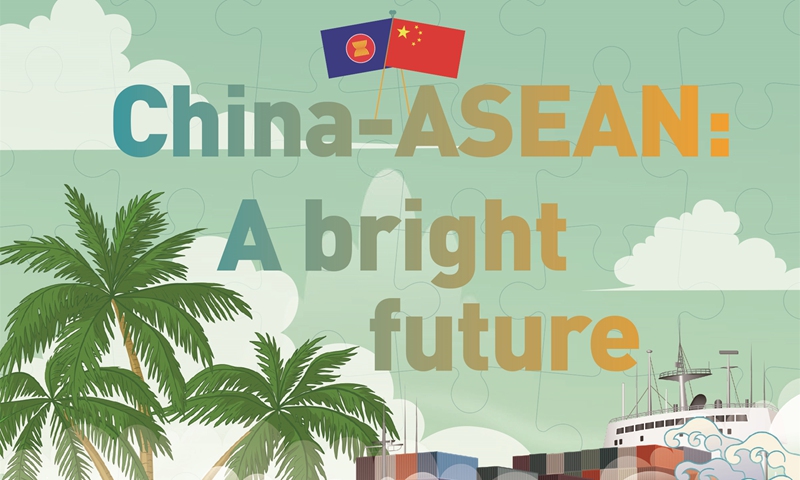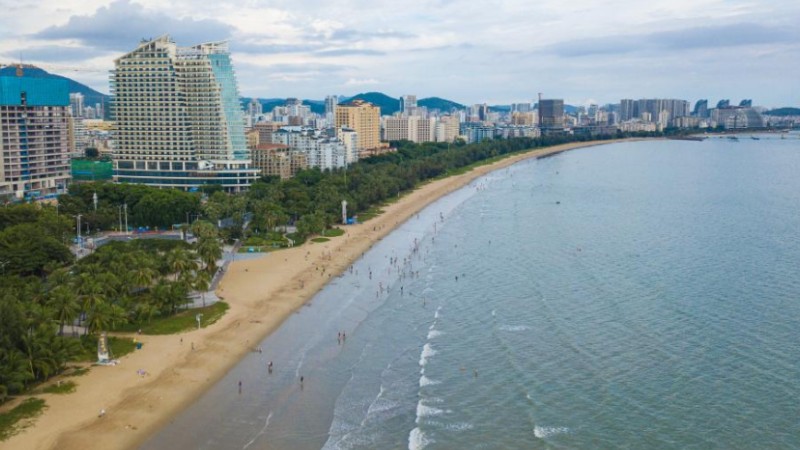China supports ASEAN central position in region, greater intl role

China-ASEAN: a bright future Graphic: GT
China firmly supports ASEAN's central position in regional cooperation and its greater role in international affairs, Chinese Premier Li Qiang said on Tuesday upon his arrival in Jakarta to pay an official visit to Indonesia and attend the 26th China-ASEAN Summit, the 26th ASEAN Plus Three Summit and the 18th East Asia Summit.
While ASEAN faces challenges due to a sluggish global economy, the Myanmar crisis, rifts on issues that include the South China Sea, and particularly the aggravating major power rivalry, experts are confident that the ASEAN can demonstrate resilience to any changing reality.
China and ASEAN share the same expectations for regional peace and growth, which is in the interests of all regional countries, and should join hands to maintain sustainable development with a bigger vision against "petty profits" offered by external forces.
Indonesian President Joko Widodo, in his opening remarks at the ASEAN Summit on Tuesday, called on the group to devise a "long-term tactical strategy that is relevant and meets people's expectations," Reuters reported.
"ASEAN has agreed to not be a proxy to any powers. Don't turn our ship into an arena for rivalry that is destructive," Widodo said.
The president urged regional leaders to ensure the ship keeps moving and sailing, saying that "We must become its captain to achieve peace, stability, and prosperity together."
Same direction
Xu Liping, director of the Center for Southeast Asian Studies at the Chinese Academy of Social Sciences, told the Global Times that against the backdrop of intensifying geopolitical issues, ASEAN focuses on growth and downplays political and security matters. China is working with the group in that direction.
Since the establishment of a strategic partnership in 2003, bilateral interactions are more focused on economic aspects and "expanding volume" in the first 10 years, Ge Hongliang, deputy director of the College of ASEAN Studies at the Guangxi University for Nationalities, told the Global Times on Tuesday.
Ge said the key phrase became "upgrading quality" for the second decade of 2013-23, which witnessed key progress in areas like the joint building of the Belt and Road Initiative, a community of a shared future, a milestone elevation of relationships into a comprehensive strategic partnership in 2021 and the Regional Comprehensive Economic Partnership(RCEP) trade deal taking effect in 2022.
ASEAN remains China's largest trading partner according to data from the first seven months of 2023, and trade volume with ASEAN members rose 2.8 percent year-on-year, per official data.
Bloomberg reported that ASEAN has replaced the US and EU to become China's largest export destination, which is interpreted by some analysts as a sign of supply chain restructuring in Asia. The phenomenon suggests that Chinese modernization with high-quality development brings new opportunities for ASEAN.
In addition to new growth points in economic and trade relations, China and ASEAN have been exploring cooperation and interactions in fields like security and people-to-people exchanges, Ge said.
China is conducting more military and security drills with ASEAN members, including Singapore, Thailand and Cambodia, many in non-traditional security fields such as maritime rescue and anti-terrorism.
Such operations can enhance mutual trust and understanding between their armed forces, and are conducive to safeguarding regional peace and stability, observers said, as the approach is different from US-led confrontational drills that focus on war scenarios.
People-to-people exchanges are expected to embrace a major boost after the interruption of the pandemic, Ge said.
The friendliness and closeness between China and ASEAN members can be seen through tourism and exchange students, as well as the popularity of Chinese TV programs and dramas in Southeast Asia, analysts said.
ASEAN's hope for regional stability and prosperity is consistent with China's hope, and sailing in the same direction is fundamental to a sustainable and promising relationship, Li Haidong, a professor at the Institute of International Relations at the China Foreign Affairs University, told the Global Times on Tuesday.
Analysts believed that external factors may create waves for China-ASEAN relations, but cannot shake its solid foundation, which dates back to the Bandung Conference in 1955, nor can it twist the direction of development which bears great potential.
Overcoming waves
The biggest challenges to the sound development of China-ASEAN relations are the disputes between some bloc members with China over the South China Sea, which have escalated in recent months.
The Philippines banned Hollywood film Barbie for a scene depicting a map of the South China Sea, opened four more military bases to US armed forces despite domestic opposition and sent construction materials to a grounded warship at China's Ren'ai Reef causing a new row.
Naval vessels from the Philippines and the US conducted their first-ever joint sail through waters west of Palawan Island in the South China Sea, Reuters reported on Monday, in the US' latest attempt to sow discord between Manila and Beijingas it seeks to tie the former onto its chariot.
When Indonesia seeks to accelerate the discussion on a "code of conduct" on the South China Sea under its chairmanship of ASEAN, the Philippines is seen as creating hurdles to the goal.
Chinese Foreign Minister Wang Yi, when addressing the Global Town Hall 2023 on Saturday, said "Attempts by certain forces outside the region to undermine peace in the South China Sea will not succeed, and the evil claws behind the scenes must be uncovered."
ASEAN unity, centrality and integration will serve the maximum and long-term interests of all members, therefore certain countries should not be misled by non-regional forces that are hijacking and hindering the ASEAN agenda due to external instigation, Li Haidong warned.
Li Haidong noted that ASEAN, as an integral multilateral mechanism in the region, is irreplaceable in safeguarding security and development even though bloc members disagree on certain issues.
The US approach toward engaging Southeast Asia is to mobilize some members to divide ASEAN, marginalize the bloc and exploit the "weak points" in Washington's rivalry with Beijing, analysts said.
ASEAN members should not be hoodwinked temporarily by the US' "promised benefits," because if a regional country alienates itself from the ASEAN, it may ultimately find that depending on the US and acting in Washington's command becomes the only option, they noted.
The South China Sea is not the dominant issue in China's relations with any ASEAN member or the bloc as a whole, Ge said, calling on regional countries to embrace regional integration, see the big picture and be wary of the petty profits the US promises, but may not deliver.
Photos
Related Stories
- China praises ASEAN role in global growth
- Chinese premier arrives in Jakarta for official visit, calls for ASEAN's greater role in int'l affairs
- China-ASEAN bilateral trade in numbers
- China, ASEAN promoting shared prosperity
- Thematic side event to China-ASEAN Expo to be held in S China’s Guangxi for the first time
- Myanmar seeks Chinese support to enhance technical high schools
- New canal project expected to deepen China-ASEAN trade ties
- 2023 China-ASEAN Education Cooperation Week kicks off in SW China
- Chinese modernization to provide new opportunities for ASEAN countries: official
- ASEAN, China to strengthen electronic trading to reduce digital gap in Southeast Asia
Copyright © 2023 People's Daily Online. All Rights Reserved.









